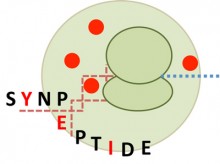 PRESS RELEASE: Multidrug-resistant strains of microorganisms pose a significant threat to public health. When the first-line antibiotics can no longer help, there have always been the second-line options, at least for the majority of bacterial pathogens. For resistant and multi-resistant pathogens there are reserve antibiotics that are applied sparingly, limited to the most difficult cases. But what if the pathogens also become resistant against these antibiotics of last resort?
PRESS RELEASE: Multidrug-resistant strains of microorganisms pose a significant threat to public health. When the first-line antibiotics can no longer help, there have always been the second-line options, at least for the majority of bacterial pathogens. For resistant and multi-resistant pathogens there are reserve antibiotics that are applied sparingly, limited to the most difficult cases. But what if the pathogens also become resistant against these antibiotics of last resort?
Antibiotic resistance is a progressively growing serious problem at an international scale, which calls for an immediate response. However, development of new antibiotics is hardly tackled by large multinational pharmaceutical companies due to the low return on investments of such drugs and difficulties in finding new biochemical mechanisms to target resistant bacteria. Since many large pharmaceutical companies stopped their investments into antibiotics research, the responsibility remains with public funding agencies, like the European Commission that supports for example the SYNPEPTIDE project.
In SYNPEPTIDE, a team of researchers from Switzerland, Germany, Netherlands and Austria aims to design new modified peptides with antibiotic activities through careful analyses of natural processes and applying these insights to synthetic biology.
Peptides possess an abundant number of biological activities, very often not properly investigated and characterized. Moreover, numerous types of posttranslational modifications (modifications after the synthesis of the peptide in the cell) endow such peptides with additional properties, like increased stability in the host. This makes peptides a very promising target for going beyond the existing functionalities and turning them into a source of new-to-nature bioactive compounds, such as antibiotics.
In SYNPEPTIDE, two classes of peptides are targeted for improvement: (1) lantibiotics, sulfur-bridge containing natural antibiotics that kill bacteria by either blocking compounds important for cell wall synthesis or by constructing pores into the cell; and (2) proteusins that also perforate the bacterial membrane and thus cause the leakage of components from the cell.
The research team takes these two classes of peptides and modifies them using a two-fold strategy: Firstly, these peptides are exposed to a broad variety of different posttranslational modifications to provide novel and additional functionalities, many of them addressed at removing specific limitations of these compounds. Secondly, the peptides are supplemented with non-canonical amino acids. Several hundreds of amino acids are known from nature, but only 20 (called canonical) are used by organisms to build proteins. Organic chemistry provides a nearly limitless supply of amino acids that are new to nature, but carry very interesting functionalities. SYNPEPTIDE now adds such amino acids to the repertoire to further diversify the biochemical characteristics of the antibiotics.
Discovering new compounds with antibacterial activity, capable to overcome the problem of drug resistance, will open up a new path for the development of novel antibiotics to treat infections that exert increasing pressure on the public health sector. With the help of synthetic biology, the SYNPEPTIDE project will make it possible to develop precisely targeted and effective novel antibiotics to fight the threat of multi-resistant pathogens.
Contact: Prof. Dr. Sven Panke, ETH Zürich, Bioprocess Laboratory D-BSSE